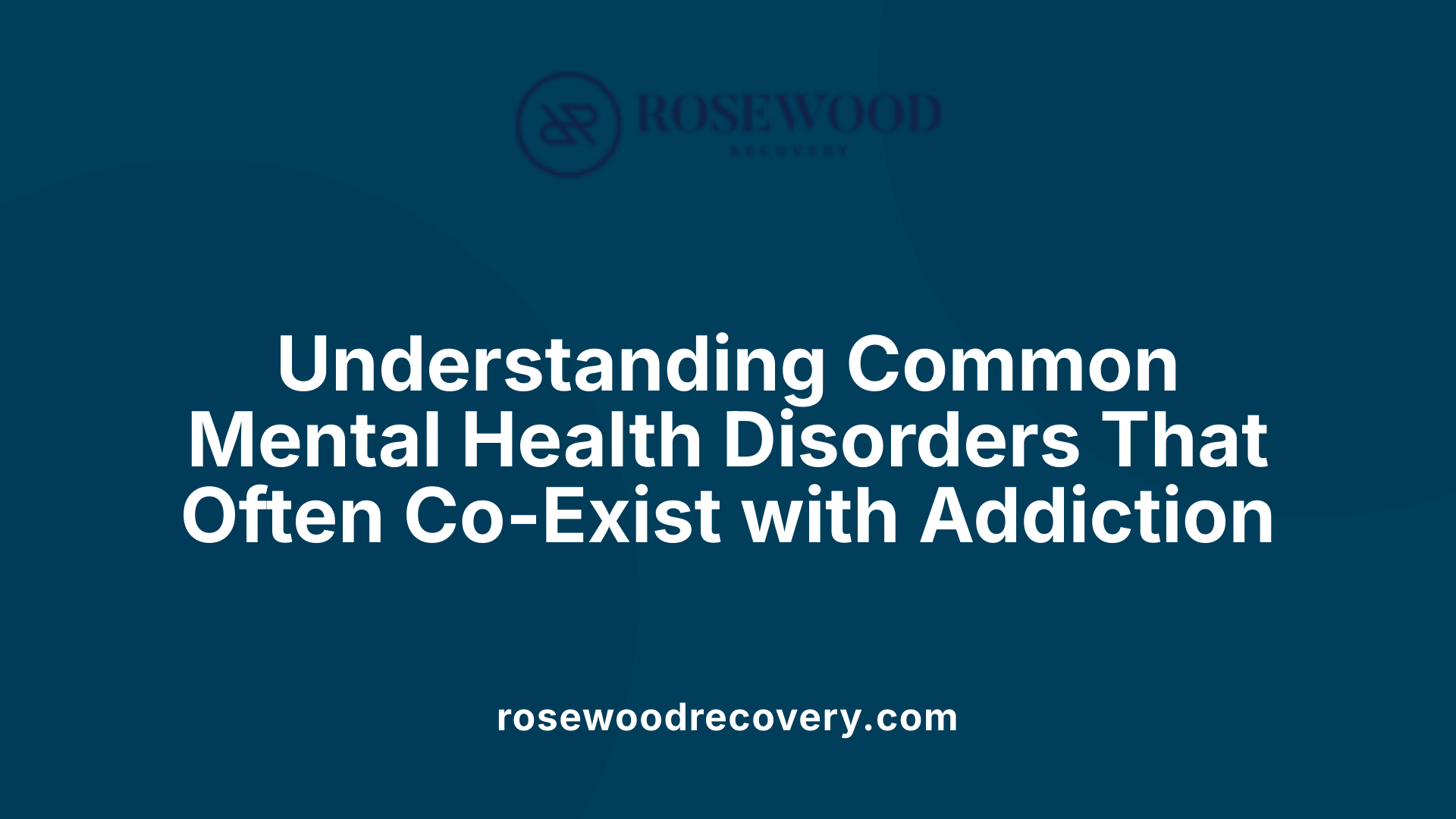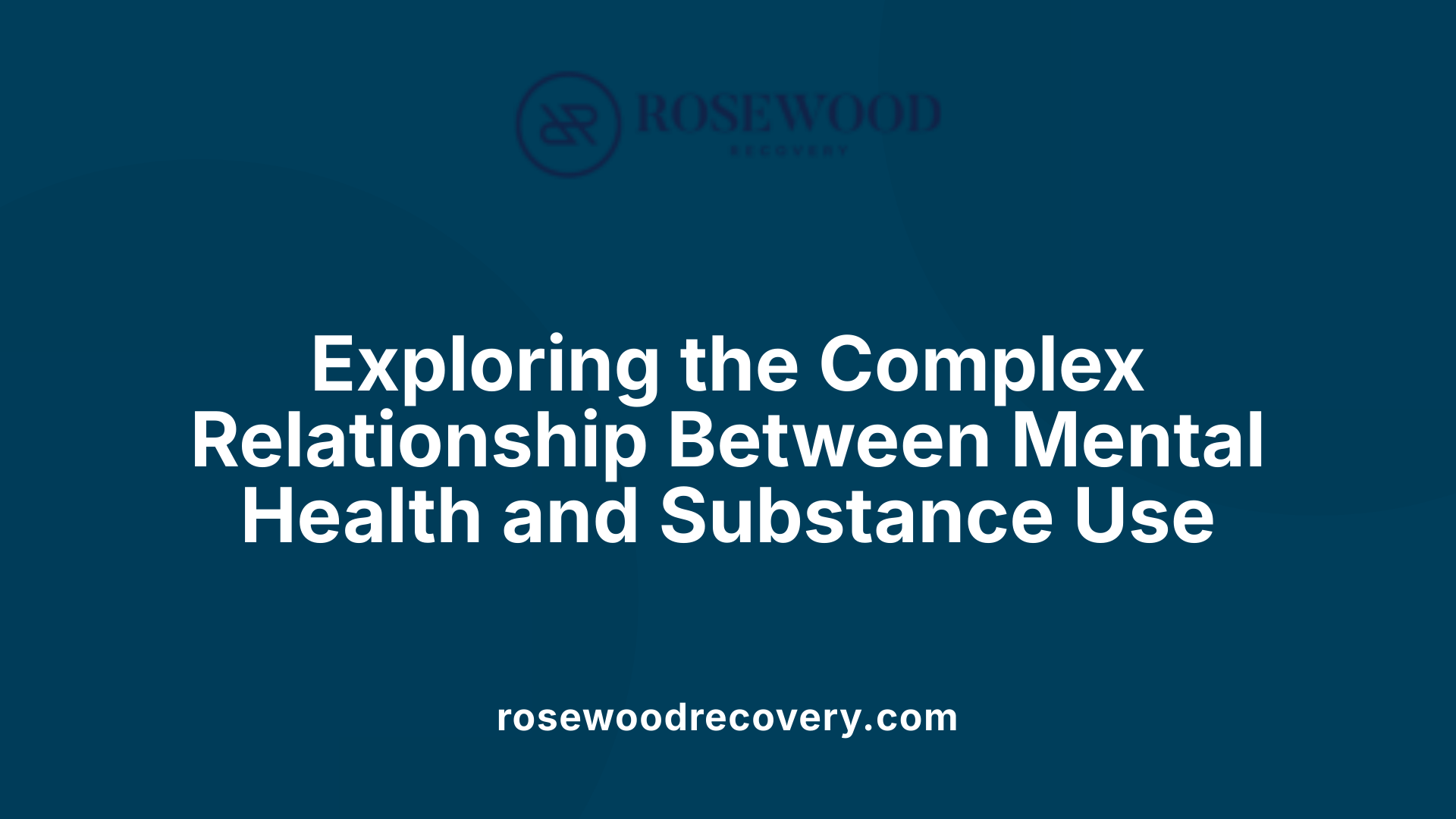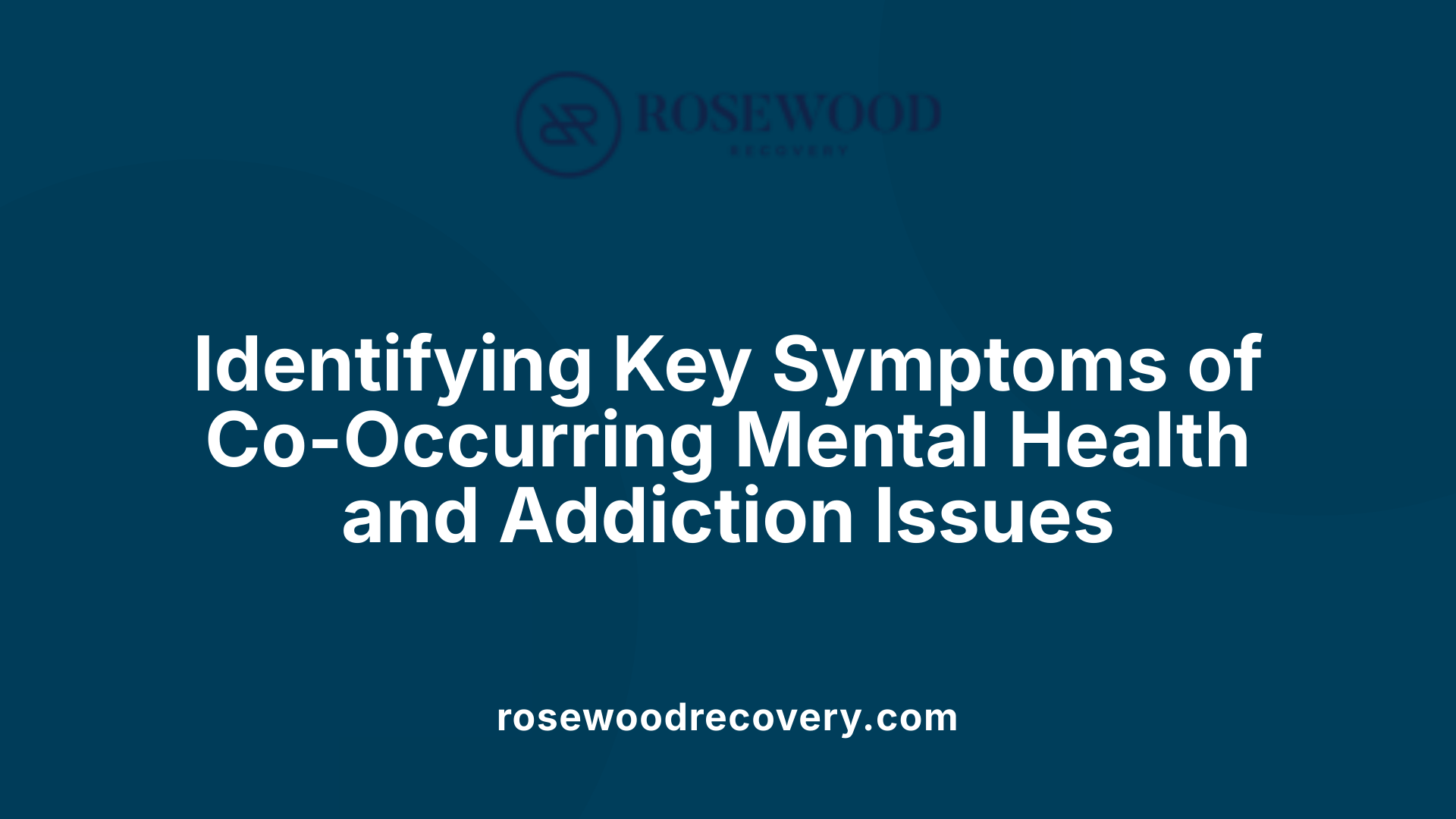Introduction to Co-Occurring Disorders
The relationship between mental health issues and addiction is intricate and bidirectional, characterized by a frequent overlap of disorders that complicates diagnosis and treatment. Recognizing common co-occurring mental health issues is crucial for improving recovery outcomes and providing effective, integrated care.
Common Mental Health Issues That Co-Occur with Addiction

What are common mental health issues that co-occur with addiction?
Many individuals struggling with addiction also face other mental health challenges. Some of the most common disorders that frequently occur alongside substance use problems include depression, anxiety disorders, bipolar disorder, PTSD, ADHD, schizophrenia, and personality disorders such as borderline or antisocial personality disorder.
Depression often presents with symptoms like hopelessness, loss of interest, changes in appetite or sleep, and feelings of worthlessness. These symptoms can lead people to use substances as a form of self-medication, temporarily alleviating emotional pain or stress.
Anxiety disorders are characterized by excessive worry, restlessness, a racing heart, or muscle tension. Individuals with anxiety may turn to alcohol or drugs to lessen their fears or calm their nerves, but this often worsens their mental health over time.
Bipolar disorder involves episodes of mania and depression. During manic phases, individuals may experience euphoria, reduced need for sleep, and impulsivity. Substance use can trigger or exacerbate these episodes, complicating treatment.
PTSD, which results from traumatic experiences, can lead to symptoms like flashbacks, hypervigilance, and emotional numbness. Many with PTSD may misuse substances to numb these distressing symptoms.
Attention deficit hyperactivity disorder (ADHD) is marked by impulsivity and difficulty maintaining attention. These individuals might seek out stimulants or other substances to manage their symptoms, risking dependency.
Schizophrenia involves hallucinations, delusions, and disorganized thinking. Substance use can trigger psychotic episodes or worsen existing symptoms.
Personality disorders, such as borderline or antisocial personality disorder, often involve patterns of instability in moods or relationships, which can increase vulnerability to addiction as individuals seek relief or stability through substances.
The interplay between these mental health issues and addiction is complex; each can influence the other in a bidirectional manner. Mental health problems may increase the likelihood of substance use as a coping mechanism, while substance abuse can cause brain changes that lead to or worsen mental health disorders.
Effective management requires accurate diagnosis and integrated treatment strategies. Combining behavioral therapies, medication, and support systems can help address both mental health and substance use problems simultaneously, significantly improving recovery chances.
The Interplay Between Mental Disorders and Substance Use

How are mental health disorders related to substance use?
The connection between mental health disorders and substance use is complex and involves a two-way relationship. People with mental health conditions such as depression, anxiety, or bipolar disorder frequently turn to substances like alcohol, drugs, or prescription medications in an effort to manage their symptoms. This self-medicating behavior provides temporary relief but can ultimately lead to addiction and worsen the mental health issues.
On the other hand, substance use itself can induce changes in brain chemistry that heighten the risk of developing mental health disorders. Chronic drug abuse affects areas of the brain responsible for decision-making, impulse control, emotions, and rewards, which can contribute to conditions like depression, anxiety, or psychosis.
Further complicating this interplay are shared underlying factors such as genetic predispositions, early trauma, or adverse social environments. These factors increase susceptibility to both mental health disorders and substance use problems.
Effective treatment for co-occurring disorders often involves an integrated approach that addresses both conditions at the same time. This comprehensive care typically includes a combination of behavioral therapies, medications, and support groups, aiming to improve overall health outcomes and stability.
Recognizing Symptoms of Comorbid Mental Health Conditions

What are the symptoms of mental health conditions associated with addiction?
Mental health issues that co-occur with substance use disorders often display a range of emotional, behavioral, physical, and social signs. Recognizing these symptoms can be crucial for early diagnosis and effective treatment.
Emotional symptoms commonly include persistent sadness, feelings of hopelessness, anxiety, mood swings, and irritability. These individuals may often feel overwhelmed or display moments of intense emotional distress. Such emotional fluctuations frequently coincide with substance use behaviors, complicating the clinical picture.
Behavioral changes are also significant indicators. They may encompass risky or secretive behaviors, sudden decline in productivity at work, neglect of responsibilities, social withdrawal, and conflicts with friends or family. Individuals might increasingly isolate themselves or lose interest in hobbies they once enjoyed.
Physical signs can provide visual clues to underlying mental health problems linked with addiction. These signs often include bloodshot eyes, tremors, weight fluctuations, unusual body odors, or changes in sleep patterns such as insomnia or excessive sleeping. Some may exhibit physical agitation or hyperactivity.
The social impact of these combined conditions becomes evident through alterations in relationships and social participation. There can be noticeable deterioration in friendships and family connections, as well as a decrease in workplace performance or engagement in usual activities. These social changes often reflect the broader toll that co-occurring disorders can take.
Understanding these overlapping symptoms is essential, as they often intertwine, making diagnosis more challenging. Proper assessment by healthcare providers involves a comprehensive evaluation to distinguish between symptoms caused by mental health issues and those resulting from substance use.
Early recognition and integrated treatment approaches can significantly improve outcomes, addressing both mental health and addiction concurrently. This holistic strategy not only alleviates symptoms but also reduces the risk of relapse, paving the way toward sustained recovery.
Diagnostic Considerations for Co-Occurring Disorders
What are the diagnostic considerations for co-occurring mental health and addiction issues?
Diagnosing co-occurring psychological and substance use disorders involves a detailed, multi-step process that requires careful attention to both conditions. Since symptoms of mental health issues like depression, anxiety, or bipolar disorder often overlap with effects of substance use, healthcare providers use comprehensive assessments to distinguish between the two.
Screening tools such as the Mini-International Neuropsychiatric Interview (M.I.N.I.), the Drug Abuse Screening Test (DAST-10), and the Addiction Severity Index (ASI) are commonly employed. These assessments help identify symptoms attributable to mental health conditions versus those caused by substances or withdrawal.
A biopsychosocial approach is vital. This involves gathering extensive information about the patient’s medical history, substance use patterns, psychological state, and psychosocial environment. Factors such as trauma history, family history, genetic vulnerabilities, and stress levels are evaluated to inform accurate diagnosis.
Differentiating symptoms can be challenging because substances may mimic or mask mental health symptoms. For example, cocaine may produce symptoms similar to mania, and alcohol dependence can resemble depression.
Cultural and safety considerations are also crucial. Cultural background influences how symptoms are expressed and understood, and safety risks related to overdose, self-harm, or violence must be carefully managed.
Early and accurate diagnosis ensures that both mental health and substance use issues receive targeted interventions. Integrated care approaches, combining pharmacotherapy and psychotherapy tailored to both conditions, have been shown to improve treatment outcomes.
In summary, diagnostic considerations for co-occurring disorders require a thorough, multidisciplinary evaluation to differentiate overlapping symptoms, assess underlying risk factors, and develop a comprehensive treatment plan that addresses both issues simultaneously.
Impact of Co-Occurring Disorders and Effective Treatment Strategies
How do co-occurring mental health disorders impact individuals with addiction?
When mental health issues such as depression, anxiety, or trauma occur alongside substance use problems, they create a complicated interplay that worsens the person's overall condition. These mental disorders often lead individuals to use substances to self-medicate, temporarily alleviating symptoms but ultimately deepening the addiction cycle.
Substance use can also cause significant changes in brain chemistry, which can trigger or intensify mental health symptoms. For example, drug abuse might disrupt neurotransmitter systems like serotonin or dopamine, leading to depression or anxiety.
This overlap results in a dual diagnosis, which complicates diagnosis and treatment. People with both conditions are at higher risk for poor health outcomes, including relapse, social isolation, and legal or financial issues. The need for comprehensive care that tackles both issues simultaneously is essential for effective recovery.
What are effective treatment options for mental health issues coexist with addiction?
Treating co-occurring mental health and substance use disorders successfully requires an integrated approach. Such treatment combines behavioral therapies, medications, and social support tailored to each individual.
Behavioral therapies like cognitive-behavioral therapy (CBT) and dialectical behavior therapy (DBT) help patients develop coping skills and address thought patterns linked to both mental health and addiction issues. Medications may include antidepressants, anti-anxiety drugs, or detoxification treatments, which are carefully chosen based on the specific diagnoses.
Support systems such as family therapy and peer support groups (like Alcoholics Anonymous or Narcotics Anonymous) are also vital in maintaining sobriety and emotional stability. Access to holistic, continuous care—via integrated programs—ensures that mental health and substance use problems are managed together.
Ongoing assessment and addressing social factors, including employment, housing, and relationships, further support recovery. Resources like SAMHSA’s treatment referral services can connect individuals to suitable care options, significantly improving long-term outcomes.
Conclusion and Future Directions
Understanding and effectively managing co-occurring mental health disorders and addiction is vital for improving patient outcomes. Advancements in integrated treatment models and increased awareness are essential steps toward comprehensive care. Continued research and policy support will foster better diagnostic tools, personalized treatment plans, and accessible resources, ultimately enhancing recovery and quality of life for affected individuals.
References
- Finding Help for Co-Occurring Substance Use and Mental ...
- Mental Health and Substance Use Co-Occurring Disorders
- Drug Abuse and Mental Illness Fast Facts
- Co-Occurring Disorders and Health Conditions
- Dual Diagnosis: Substance Abuse and Mental Health
- Co-occurring Disorders - Caron Treatment ...
- Co-Occurring Disorders and Other Health Conditions
- Co-Occurring Mental and Substance Use Disorders
- How Mental Health and Addiction Are Connected

.jpeg)


